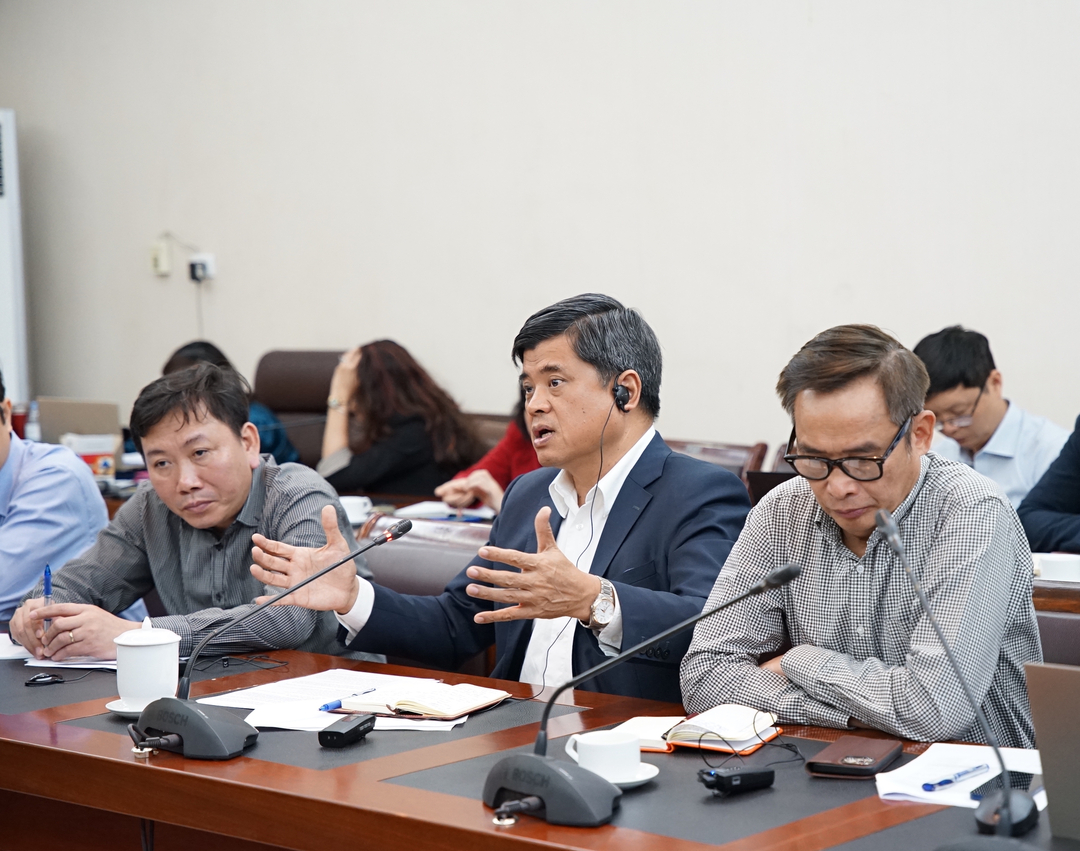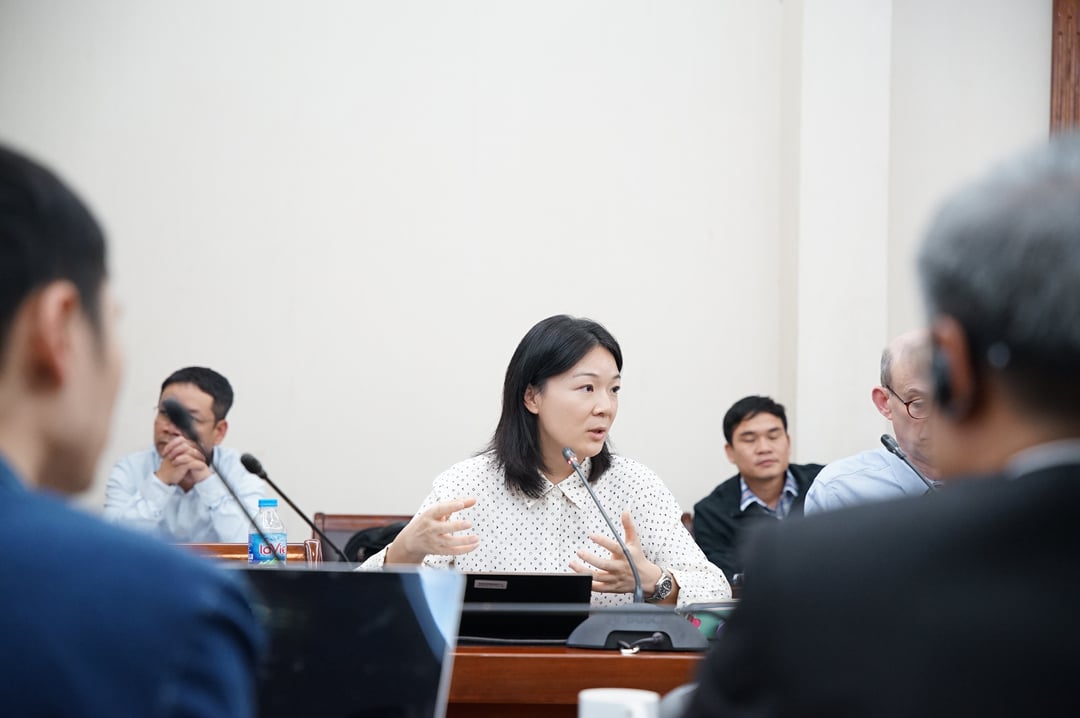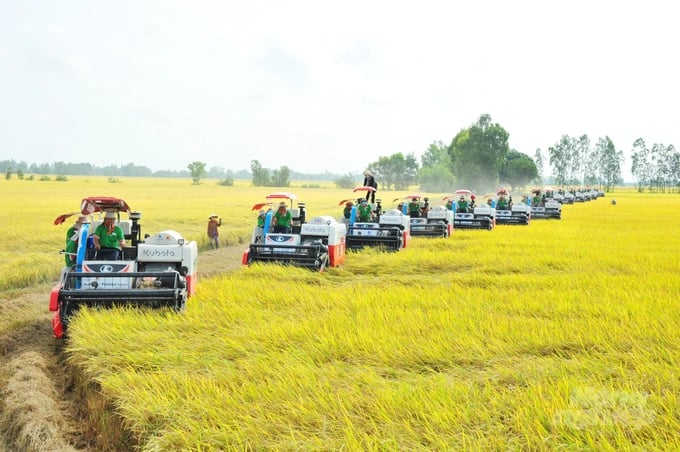June 16, 2025 | 22:10 GMT +7
June 16, 2025 | 22:10 GMT +7
Hotline: 0913.378.918
June 16, 2025 | 22:10 GMT +7
Hotline: 0913.378.918

On March 7, Deputy Minister Tran Thanh Nam had a working session with the World Bank regarding the support for the "Scheme for sustainable production of 1 million ha of high quality rice cultivation in the Mekong Delta".
According to Mr. Tran Thanh Nam, this is an important project advised by the Ministry of Agriculture and Rural Development to the Government. Nevertheless, it is also the desire of Mekong Delta communities in order to increase the value of rice, raise income and improve organization in agricultural production, ensuring the commitment to achieving net-zero emissions by 2050.
Deputy Minister Tran Thanh Nam said, in fact, the Mekong Delta faces more challenges besides climate change and production organization. While rice is the primary source of food security, the income of rice farmers remains extremely low.
“The Mekong Delta is tending to convert the cultivation of rice to other crops which can generate higher income, but if this issue continues to happen, the country’s food security will be threatened. We are determined to keep 3.8 million hectares of paddy fields, while also making sure to secure income for farmers.”
As for the World Bank, Ms. Zhou Cheng, Senior Specialist in Climate Finance, introduced the Transformative Carbon Asset Facility (TCAF), a commission fund of the World Bank that supports the efforts of countries in implementing market-based carbon pricing and facilitating private sector investments in low-carbon technologies.

Ms. Zhou Cheng, Senior Specialist in Climate Finance, introduced the Transformative Carbon Asset Facility (TCAF) at the working session.
TCAF's goal is to encourage Vietnam to develop high-quality rice cultivation and low-carbon emissions by giving results-based climate/carbon financing aid. Accordingly, TCAF can support Vietnam to implement the scheme by constructing a non-refundable plan for training, and building a Measurement – Reporting - Verification (MRV) system on the level of emission reduction. The WB can introduce and connect with carbon credit buyers through the fund. TCAF can also provide consultation for Vietnam in selecting carbon credits sales options in the world market.
TCAF is expected to support USD 20 million for phase 1, which is a non-refundable grant, and USD 20 million from the Scaling Climate Action by Lowering Emissions (SCALE) to buy about 5- 10% of certified carbon credits from the 1-million-hectare program, depending on the Government’s decision whether to transfer or not. The ultimate purpose is to pilot so that Vietnam can later transfer carbon credits to other countries.
It is expected that the World Bank will advance USD 10 million from the TCAF to build the baseline (MRV), and conduct training along with capacity building. All actions will be directly related to the VnSAT project area. The remaining USD 10 million will only be available when Vietnam signs to join the Memorandum of Partnership Agreement (MOPA). The payment is based on verified results. To get the first USD 10 million in support, Vietnam needs to sign the Letter of Intent with the World Bank to support the Project Idea Note (PIN). In phase 2, TCAF will be mobilizing additional capital from the World Bank's SCALE fund for approximately USD 60 million.

The “Scheme for sustainable production of 1 million ha of high quality rice cultivation in the Mekong Delta” aims to increase the value of rice as well as farmer’s income, ensuring Vietnam’s commitment to achieving net-zero emissions by 2050.
Mr. Tran Thanh Nam highly appreciated the support of the World Bank and TCAF for the project; however, he affirmed that this is a difficult project with many challenges, from changing farmers' awareness, the soil salinity, to problems concerning the market.
The Agriculture and Rural Development leader also mentioned that one of the difficulties when implementing this project was the investment in the irrigation system.
Deputy Minister Tran Thanh Nam asked the World Bank to have projects to support cooperatives and businesses to invest in irrigation systems in areas that are planting low-emissions rice.
"This is the first project in the world on low-emissions rice cultivation, demonstrating the determination of the Government of Vietnam to its commitment to the world and also the determination of ministries and sectors to make the transition," said Mr. Tran Thanh Nam. He hoped that the World Bank and TCAF could support the project in measuring and gathering field data, transforming farmers' awareness, improving irrigation infrastructure and investing in agricultural cooperatives so that they can improve capacity and take a proactive stance in their fields.
Translated by Tran Bao Ngoc
![Turning wind and rain into action: [4] Bringing climate bulletins to remote and isolated areas](https://t.ex-cdn.com/nongnghiepmoitruong.vn/608w/files/linhnhp/2025/06/14/1152-z6704423696987_15fd32ffc26d590d204d520c9dac6786-nongnghiep-151141.jpg)
(VAN) The Vietnam Agriculture and Nature Newspaper interviewed Mr. Vu Thai Truong, Acting Head of Climate Change and Environment at UNDP Vietnam, to gain deeper insight into how climate bulletins are delivered to farmers.

(VAN) In Tien Giang, a high-tech shrimp farm has developed a distinctive energy-saving farming model that has yielded promising results.
![Turning wind and rain into action: [3] 300.000 farmers benefit from agro-climatic bulletins](https://t.ex-cdn.com/nongnghiepmoitruong.vn/608w/files/news/2025/06/12/e5a48259d6a262fc3bb3-nongnghiep-125122.jpg)
(VAN) The agro-climatic bulletin has become a valuable tool for farmers in the Mekong Delta. After more than five years of implementation, the initiative is gradually being expanded nationwide.
![Turning wind and rain into action: [2] Providing forecasts to the people](https://t.ex-cdn.com/nongnghiepmoitruong.vn/608w/files/news/2025/06/12/e5a48259d6a262fc3bb3-nongnghiep-103927.jpg)
(VAN) In addition to improving the quality of hydrometeorological forecasts, putting forecast bulletins into practical use is crucial for production and disaster prevention.

(VAN) Blue carbon is receiving attention for its rapid absorption capacity and vast potential. It represents a promising nature-based solution to respond to climate change.
/2025/06/11/3507-1-161904_583.jpg)
(VAN) Seagrass beds and coral reefs serve as 'cradles' that nurture life in the ocean depths, creating rich aquatic resources in Vietnamese waters.
![Turning wind and rain into action: [1] Forecasting for farmers](https://t.ex-cdn.com/nongnghiepmoitruong.vn/608w/files/news/2025/06/11/e5a48259d6a262fc3bb3-nongnghiep-111919.jpg)
(VAN) Weather is no longer just a matter of fate. Forecasts have now become an essential companion for farmers in every crop season.